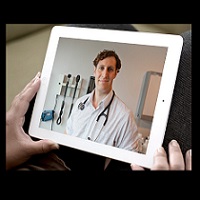 The telemedicine market is growing at a significant rate due to increasing healthcare costs, a growing geriatric population, and rising incidence of chronic diseases mixed with increasing government funding and growing technological advances. Pharmion, a research based global management consulting firm focused on pharma and healthcare industry, estimates the telemedicine market in the United States will cross $13 billion by 2021. According to P&S Market Research “the global telemedicine market was valued at $17,878.7 million in 2015, and it is expected to grow at a CAGR of 18.7% during 2016 – 2022.” With numbers like these it is clear telemedicine is going nowhere but up. Check out some of the latest news below.
The telemedicine market is growing at a significant rate due to increasing healthcare costs, a growing geriatric population, and rising incidence of chronic diseases mixed with increasing government funding and growing technological advances. Pharmion, a research based global management consulting firm focused on pharma and healthcare industry, estimates the telemedicine market in the United States will cross $13 billion by 2021. According to P&S Market Research “the global telemedicine market was valued at $17,878.7 million in 2015, and it is expected to grow at a CAGR of 18.7% during 2016 – 2022.” With numbers like these it is clear telemedicine is going nowhere but up. Check out some of the latest news below.
American Telemedicine Association announces ATA 2016, the world’s largest and most comprehensive conference focused on telemedicine, digital, connected and mobile health. ATA 2016 will take place May 14-17 at the Minneapolis Convention Center. For over 20 years, the American Telemedicine Association’s (ATA) Annual Conference & Trade Show has been the premier forum for healthcare professionals and entrepreneurs in the American Telemedicine Association website.
Suzanne Delbanco and Lea Tessitore discuss “The Payment Reform Landscape: How Does Telehealth Fit Into A High-Value Purchasing Strategy?” on HealthAffairs Blog. Both employers and employees benefit from telemedicine as it increases competition among providers, helps to lower costs and compels local physicians to improve the patient experience Telemedicine also has a positive effect on the market as long as it’s focused on enhancing the quality of care.
Tech companies are striving to put a broad array of health-related services into the hands of patients, and investors are lining up to back them. In the latest such deal, Chicago startup Opternative Inc. has raised $6 million in Series A venture funding for an app that lets people take an eye exam using their smartphones and a personal computer at home reports Chicago Inno.
Multiple Sclerosis News Today asks, can fatigue management and physical activity interventions for MS be offered effectively by telehealth? Dr. Matthew Plow and Case Western Reserve University investigators are running clinical trials across 10 states to find out.
Arkansas was late to the game of telemedicine but things are changing. JD Supra Business Advisor reports that the Arkansas Board of Medicine has a committee dedicated to improving limiting regulations of telemedicine. Currently, Arkansas Code 17-80-117 and Regulation No. 2(8) require first meetings between physicians and patients to be in person. The committee hopes to “improve the practice environment by allowing a doctor to establish a relationship with a patient “using a face-to-face real-time audio and visual technology” in certain situations.”
